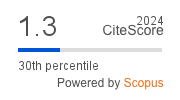The clinical potential and limits of the all-ceramic fixed partial denture restorations
Vol. 40 No. 4 (2007): December 2007
Articles
December 1, 2007
Downloads
Laksono, H. (2007). The clinical potential and limits of the all-ceramic fixed partial denture restorations. Dental Journal (Majalah Kedokteran Gigi), 40(4), 186–192. https://doi.org/10.20473/j.djmkg.v40.i4.p186-192
Downloads
Download data is not yet available.
- Every manuscript submitted to must observe the policy and terms set by the Dental Journal (Majalah Kedokteran Gigi).
- Publication rights to manuscript content published by the Dental Journal (Majalah Kedokteran Gigi) is owned by the journal with the consent and approval of the author(s) concerned.
- Full texts of electronically published manuscripts can be accessed free of charge and used according to the license shown below.
- The Dental Journal (Majalah Kedokteran Gigi) is licensed under a Creative Commons Attribution-ShareAlike 4.0 International License

















